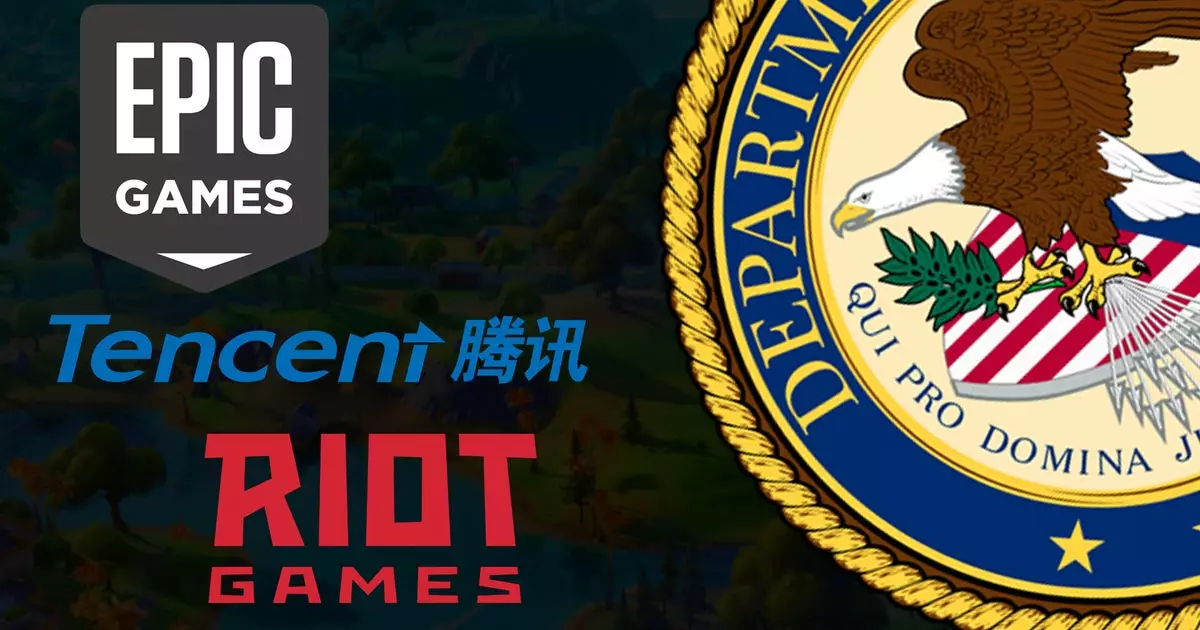The dynamic landscape of the tech industry often brings about intricate relationships between major players, leading to questions about governance and fairness. A recent case that has illustrated this phenomenon involves Epic Games, the company behind the popular Unreal Engine. In a notable turn of events, two directors on Epic’s board have resigned amidst an antitrust investigation by the U.S. Department of Justice (DoJ). This decision has highlighted the complex nature of corporate governance and the implications of cross-ownership in competing firms.
The DoJ’s investigation revealed potential conflicts of interest regarding two directors, Ben Feder and David Wallerstein, who were appointed to the Epic board by Tencent. Tencent, a colossal presence in the gaming industry, owns Riot Games outright, thus positioning it as a competitor to Epic. The antitrust laws, particularly the Clayton Act, prohibit personnel from one competing company from holding positions in another, addressing concerns about unfair advantages and collusion. The resignation of Feder and Wallerstein appears to be a move to mitigate potential legal repercussions, as their continued presence on the board raised red flags for regulatory bodies.
The background of these directors is noteworthy. Feder’s tenure as the President of International Partnerships at Tencent, preceded by his role as CEO of Take-Two Interactive—an influential game publisher under Tencent—raises crucial questions about his influence over Epic Games, despite its competitive stance against Tencent’s interests. Wallerstein, serving as Senior Executive Vice President at Tencent until early this year, further emphasizes the direct ties to a firm that operates in the same market. Their departures reflect a broader issue within corporate governance where loyalty and competition often clash.
Antitrust laws exist to regulate market practices that could potentially lead to monopolistic behavior by major corporations. The underlying intention is to foster a fair playing field that encourages competition, innovation, and choice for consumers. The DoJ’s intervention in this scenario serves as a reminder that even titans like Epic Games are not above the scrutiny of regulatory bodies. Given that the gaming industry has seen previous antitrust challenges—such as the scrutiny faced by Valve and Microsoft during their corporate maneuvers—the situation surrounding Epic highlights the critical need for compliance with these regulations.
Interestingly, this incident underscores the changing dynamics of corporate governance in the tech sector, where the stakes are continually rising. As companies grow in size and reach, the lines between competition and collaboration can blur, leading to complex stakeholder relationships that might defy traditional governance models. The requirement for Tencent to amend its shareholder agreement with Epic, which includes a prohibition on appointing directors to the board, is a structural change aimed at preventing recurrence of this issue and ensuring clearer boundaries between the two competitors moving forward.
This incident does not merely affect the internal workings of Epic Games and Tencent; it also establishes a precedent for how corporate governance must adapt to the growing interconnectedness of tech companies. As alliances form and dissolve with increasing frequency, the need for stringent adherence to antitrust laws becomes more pronounced. The gaming industry, in particular, is witnessing unparalleled growth, attracting the attention of regulators keen on preventing any potential monopolistic behavior.
Moreover, as companies expand their influence rapidly, the need for transparency and ethical governance becomes paramount. The gaming sector, often lauded for its creativity and innovation, must balance this with the responsibility that comes with significant market power. The outcome of the DoJ’s investigation could potentially lead to more stringent regulations governing relationships between major stakeholders in various tech domains.
The resignation of Ben Feder and David Wallerstein from the Epic Games Board represents more than just a corporate reshuffle; it signals a critical moment in the ongoing discourse surrounding antitrust laws and corporate governance in the tech industry. This case serves as a cautionary tale, indicating that large corporations must remain vigilant about their governance structures in the face of regulatory scrutiny. As the industry evolves, the relationship between competitors and collaborators will continue to be a defining characteristic, necessitating a careful approach to maintain compliance while fostering innovation. The outcomes will not only influence the involved companies but could also shape the future landscape of the gaming industry as a whole.


Leave a Reply